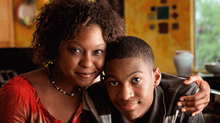Living in Paradox Central
Q. Our 10-year-old daughter seems so immature at times, but then turns around and acts like a little adult. We don't want to baby her, but we don't want to treat her like a teenager yet, either. What expectations should we have for her at this age?
A. If there's one word that sums up preteens, it's paradox. Preteens live simultaneously in two completely opposite worlds—the world of childhood and the world of adulthood. This can be maddening, and paradoxically, quite exciting! So the most realistic expectation you can have is that your child will almost always defy your expectations.
Still, there are some general rules of thumb you can go by:
Capitalize on their trust
Preteens have yet to develop the jaded skepticism of older teens. They are still generally willing to trust. This time of life is, in many ways, a last-stop refueling station before the long desert drive of adolescence. Take this opportunity to build on that trust. If you make a promise, keep it. If you say you'll be somewhere, be there. If you offer your support, give it.
At the same time, preteens are beginning to develop a more mature "baloney detector." If you want to be an example to your young teen, it's essential that you do so through a commitment to honesty and vulnerability. This can be hard for parents who have tried hard to be infallible. But as your child gets older, she needs to see that you sometimes fail. Preteens need models of truthfulness, sincerity, humility, and repentance. If your preteen sniffs out insincerity or hypocrisy, you'll quickly lose your place of leadership in her life.
Be patient with the process
Preteens and young teens have a huge tendency toward "in-one-ear-out-the-other" behavior. You've probably had the experience of telling your daughter why a certain behavior is bad, only to see her do it again two weeks later with no memory of your discussion. She's probably not being obstinate—because her brain is in overdrive, she really doesn't have a memory of that discussion!
At the same time, young teens are developing a keen ability to see through charades, to understand when they're being marketed to, and to be aware of consequences. I've found that preteens are able to see a situation objectively, but often can't apply it to their own lives and choices. They still need the adults in their lives to spell things out for them—a lot. Try to be patient as you explain for the 18th time why she can't see R-rated movies or go to a co-ed sleepover. It may be exasperating for you, but it's essential for her.
Treat 'em like adults … and kids
Preteens want to be treated like adults, to have more freedoms, to make more decisions on their own, to not be treated like the fourth-graders that they are. It's important to talk to young teens with an adult voice, and to begin the move from a "follow-me" approach to a "let's-walk-together" style of guidance. Allow your child to ask hard questions and show her how to seek out answers. Rather than telling your daughter what to do, work with her to come up with solutions to problems.
Still, preteens are still very much children, and need the opportunity to act that way. A girl may move out of her childhood music choices, but still love to play with Barbie dolls. A boy may not want Mom to kiss him at the bus stop, but still keep stuffed animals on his bed. Let your preteen hold on to her childhood. She'll give it up soon enough.
It's not that your daughter is either a child or a young adult (with some magic line being crossed at some point); she's both at the same time. Preteens aren't just in-between, they're in an overlap zone—childhood remains even as they step into the young adult world.
LIVING WITH PARADOX isn't easy. But take comfort in knowing that this stage is somehow part of God's wonderful design for your child's transition to healthy independence and adulthood.
Mark Oestreicher is the president of Youth Specialties (YouthSpecialties.com), the leading provider of resources and training for Christian youth workers.
Read more articles that highlight writing by Christian women at ChristianityToday.com/Women
 Read These Next
Read These Next
 Moms in MinistryNo, that's not an oxymoron, just a challenge. Meet five mothers who've made it work
Moms in MinistryNo, that's not an oxymoron, just a challenge. Meet five mothers who've made it work
 Beyond the Birds and the Bees3 conversations to have before your child goes off to college
Beyond the Birds and the Bees3 conversations to have before your child goes off to college
 Fall-Apart MomentsParenting inevitably leaves us discouraged, empty, and grasping . . . but maybe that's a good thing.
Fall-Apart MomentsParenting inevitably leaves us discouraged, empty, and grasping . . . but maybe that's a good thing.








 Homepage
Homepage